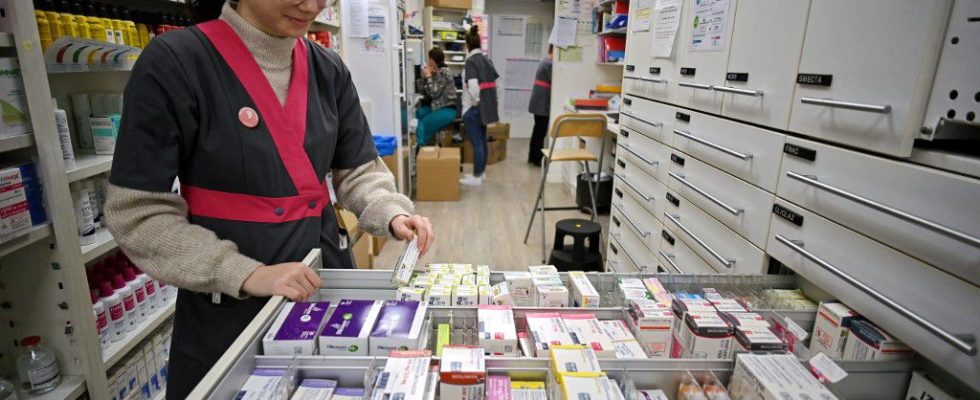Specialists have been sounding the alarm for several months. Thursday October 26, it is the pharmacist Pierre-Olivier Variot, president of the Union of Unions of Community Pharmacists (USPO), who sticks to it on Franceinfo. “Nearly 4,000 drugs” are now in rupture or at risk of rupture in France, he reveals. At the top of the products that are missing: antibiotics, antidiuretics, amoxicillin, cortisone, etc.
“We have occasional breakups, which will last a month, two months, some perhaps more. But we also have breakups which are long-term and, there, it becomes dramatic,” added Pierre-Olivier Variot . One of the latest illustrations: last spring, many pharmacies in France no longer had abortion pills on their shelves. This time, the subject is particularly sensitive since it concerns women’s rights.
The phenomenon is getting worse
But these shortages are not new and they peaked during the winter of 2022-2023, when amoxicillin, certain corticosteroids and paracetamol suffered periods of supply tension, of varying duration, in a context of triple epidemic of Covid-flu-bronchiolitis. A phenomenon which tends to worsen over the years: if we are now talking about 3,700 drug shortages or risks of drug shortages which were reported on French soil in 2022, they were estimated at 700 in 2018 and at less than 200 in 2012.
How can we understand these repeated shortages? The causes are multiple. First of all, they can be cyclical, linked for example to the war in Ukraine. While many drugs are produced in kyiv, the conflict has disrupted the drug supply chain. Also, production does not meet needs, which is what happened with paracetamol. Essential drugs, numbering 450 according to the government’s controversial list, older but less profitable, have been gradually shunned by the pharmaceutical industry. And some drugs, such as an anti-rejection drug for kidney transplants, are now only supplied by one company. Enough to weaken the manufacturing chain.
Relocation, price review… The executive seeks solutions
Result: production is done abroad. India and China now manufacture 80% of the world’s active drug ingredients because costs are lower there. For certain products, France is still dependent on the Middle Kingdom. But, during epidemics like that of Covid-19, China prefers to keep its medicines for itself. To ensure that France becomes even more autonomous in this area, Emmanuel Macron announced, in June, the relocation of the production of around fifty essential medicines.
Lately, the executive has sought to tackle shortages on several fronts: relocation of the production of drugs deemed essential, better stock management, etc. Take the case of amoxicillin, the government has proposed to the 13 laboratories which produce the drug for French territory an increase in its price of 10% between October 1 and the end of April 2024. In exchange, the manufacturers will have to meet objectives increased production, set on a case-by-case basis by health authorities.
Among the important points, there is also the need for better distribution of stocks. Aurélien Rousseau, Minister of Health, spoke on October 3, on France Inter “over-stocks” made by certain “big pharmacies”. As a response to this problem, the executive decided to “give back to those who distribute the responsibility that all pharmacies, including the smallest, have access to these stocks”.
Single medications
At the beginning of September, the government took another flagship measure: the delivery of drugs to the unit made compulsory for certain antibiotics in supply shortage. At the same time, the National Medicines Safety Agency (ANSM) also took on the task: the organization presented a “winter plan” aimed at limiting tensions on certain “major drugs”. This plan “aims to anticipate shortages of certain drugs,” Christelle Ratignier-Carbonneil, director general of the ANSM, explained to AFP. And, on October 24, it was Brussels’ turn to present its plan to combat drug shortages to anticipate winter supply difficulties. Concretely ? A solidarity mechanism will be set up at European level which consists (when the national stock allows) of redistributing a medicine to the member country which lacks it.
For their part, pharmaceutical laboratories are committed to responding. Starting with Upsa with its 300 million boxes produced per year. In a press release published on October 16, No. 2 on the paracetamol market in France, which manufactures Dafalgan and Efferalgan, for its part guarantees “zero shortages” for this winter. It promises to reorganize its production lines if necessary and to diversify sources of supply of raw materials. All these efforts should alleviate drug shortages this winter, without completely preventing them.
